情态动词+不定式完成式
情态动词用法归纳(全)(1)
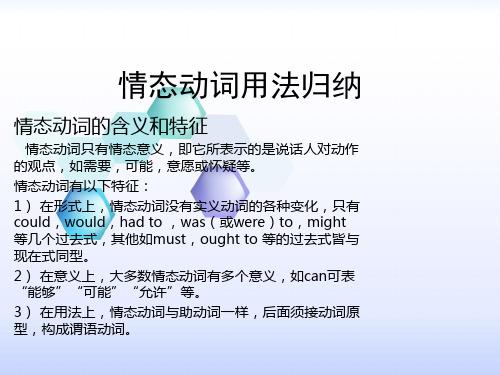
2) need 作情态动词用时, 常用于疑问句、否定句。在肯定句 中一般用must, have to, ought to, should代替。
1.You needn’t come so early. 2. ---- Need I finish the work today?
---- Yes, you must. / No, you needn’t.
may(might)有以下几种形式:
时态 现在式 过去式
肯定式 may might
否定式 缩略否定式
may not
mayn't
might not mightn't
may(might)的基本用法:
1)表可能,暗含不确定,等于possibly,perhaps,maybe,如: He may be busy getting ready for his trip. 他也许在忙于准备外出旅游。
You might ask before you borrow my car. 你可以先问问我再借我的车子嘛。
you might have helped me. 你完全可以帮我一把的呀。
4)May 与might的比较:
might 可表虚拟语气,may则不可以,如: It might help a little if you would only keep clean .
He should do some work,but he doesn't want to 他应该做些工作,但是他不想做。
4)表推测,暗含很大的可能,如:
The film should be very good as it is starring first-class actors. 这部电影是一流的演员主演的,可能拍得很好。
不定式完成式to have done用法
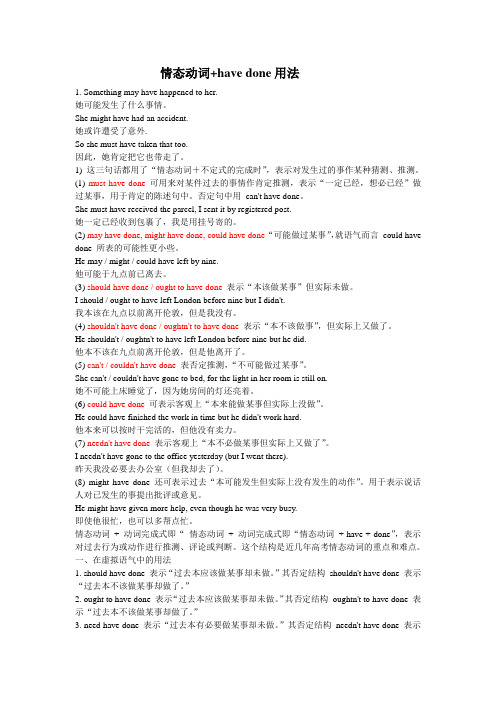
情态动词+have done用法1. Something may have happened to her.她可能发生了什么事情。
She might have had an accident.她或许遭受了意外.So she must have taken that too.因此,她肯定把它也带走了。
1) 这三句话都用了“情态动词+不定式的完成时”,表示对发生过的事作某种猜测、推测。
(1) must have done 可用来对某件过去的事情作肯定推测,表示“一定已经,想必已经”做过某事,用于肯定的陈述句中。
否定句中用can't have done。
She must have received the parcel, I sent it by registered post.她一定已经收到包裹了,我是用挂号寄的。
(2) may have done, might have done, could have done “可能做过某事”,就语气而言could have done 所表的可能性更小些。
He may / might / could have left by nine.他可能于九点前已离去。
(3) should have done / ought to have done表示“本该做某事”但实际未做。
I should / ought to have left London before nine but I didn't.我本该在九点以前离开伦敦,但是我没有。
(4) shouldn't have done / oughtn't to have done 表示“本不该做事”,但实际上又做了。
He shouldn't / oughtn't to have left London before nine but he did.他本不该在九点前离开伦敦,但是他离开了。
英语语法中的情态动词用法

英语语法中的情态动词用法在英语语法中,情态动词是一类特殊的动词,用于表达说话者的态度、意愿、推测、能力等。
它们在句子中起到了重要的作用,帮助我们准确地表达自己的意思。
本文将对英语语法中的情态动词用法进行探讨,帮助读者更好地理解和运用这一语法现象。
一、情态动词的定义和特点情态动词是一类助动词,与实义动词不同,它们本身没有词义,只用来表示说话者的态度、意愿、推测、能力等。
英语中常见的情态动词有can、could、may、might、shall、should、will、would、must等。
这些情态动词在用法上有一些特点:1. 情态动词后面一般接动词原形,而不加s/es或ed等变化。
例如:- She can swim.(她会游泳。
)- They should go to bed early.(他们应该早点上床睡觉。
)2. 情态动词本身不具有时态和人称的变化,而是通过后面的动词来表示。
例如:- He will come tomorrow.(他明天会来。
)- They might have finished the work.(他们可能已经完成了这项工作。
)3. 情态动词后面的动词一般不用于被动语态,而是用于进行时、完成时等。
例如:- She can't be sleeping.(她不可能正在睡觉。
)- We should have finished the report by now.(我们现在应该已经完成了这份报告。
)二、情态动词的用法1. 表示能力和能力的推测情态动词can和could用于表示能力,may和might用于表示推测。
例如:- He can speak three languages.(他会说三种语言。
)- She could play the piano when she was young.(她小时候会弹钢琴。
)- He may be busy.(他可能很忙。
)- They might have left already.(他们可能已经离开了。
情态动词的用法整理归纳

情态动词的用法整理归纳为了做好高中英语的备考复习,下面由小编为你精心准备了“情态动词的用法整理归纳",持续关注本站将可以持续获取更多的考试资讯!情态动词的用法整理归纳情态动词有can (could), may (might), must, have to,shall (should,will (would),dare (dared),need (needed), ought to等。
情态动词无人称和数的变化;不能单独使用,必须与其后的动词原形构成谓语。
一、 can, could1)表示能力(体力、知识、技能)。
Can you lift this heavy box?(体力)Mary can speak three languages.(知识)Can you skate?(技能)此时可用be able to代替。
Can只有一般现在时和一般过去式;而be able to则有更多的时态。
I’ll not be able to come this afternoon.当表示“经过努力才得以做成功某事”时应用be able to,不能用Can。
如:He was able to go to the party yesterday evening in spite of the heavy rain.2)表示请求和允许。
-----Can I go now?----- Yes, you can. / No,you can’t.此时可与may互换。
在疑问句中还可用could,might代替,不是过去式,只是语气更委婉,不能用于肯定句和答语中。
---- Could I come to see you tomorrow?---- Yes, you can. ( No,I’m afraid not. )3)表示客观可能性(客观原因形成的能力)。
They’ve changed the timetable,so we can go by bus instead.This hall can hold 500 people at least.4)表示推测(惊讶、怀疑、不相信的态度),用于疑问句、否定句和感叹句中。
情态动词的用法总结归纳表
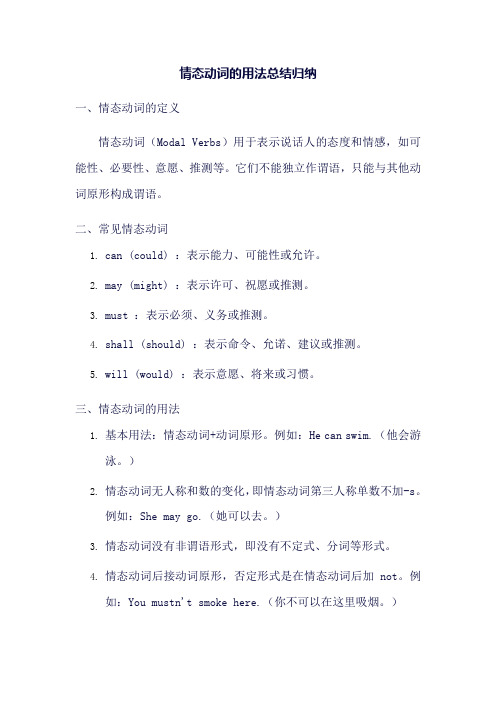
情态动词的用法总结归纳一、情态动词的定义情态动词(Modal Verbs)用于表示说话人的态度和情感,如可能性、必要性、意愿、推测等。
它们不能独立作谓语,只能与其他动词原形构成谓语。
二、常见情态动词1.can (could) :表示能力、可能性或允许。
2.may (might) :表示许可、祝愿或推测。
3.must :表示必须、义务或推测。
4.shall (should) :表示命令、允诺、建议或推测。
5.will (would) :表示意愿、将来或习惯。
三、情态动词的用法1.基本用法:情态动词+动词原形。
例如:He can swim.(他会游泳。
)2.情态动词无人称和数的变化,即情态动词第三人称单数不加-s。
例如:She may go.(她可以去。
)3.情态动词没有非谓语形式,即没有不定式、分词等形式。
4.情态动词后接动词原形,否定形式是在情态动词后加not。
例如:You mustn't smoke here.(你不可以在这里吸烟。
)5.带有情态动词的疑问句和否定句变换只需将情态动词提到主语前或直接在情态动词后加not。
例如:Can he dance?(他会跳舞吗?)He can't dance.(他不会跳舞。
)6.情态动词可以表示推测和可能性。
例如:It may rain tomorrow.(明天可能会下雨。
)7.情态动词可以表示命令和建议。
例如:You should study hard.(你应该努力学习。
)8.情态动词可以表示习惯和规律。
例如:He will arrive at nine.(他将在九点到达。
)9.情态动词可以与完成时连用,表示对过去的推测和猜测。
例如:She may have gone to the cinema.(她可能去看电影了。
)10.情态动词可以与进行时连用,表示对现在的推测和猜测。
例如:He must be studying in the classroom.(他一定在教室里学习。
ought to, can, may, must, should, need情态动词+完成时态的用法
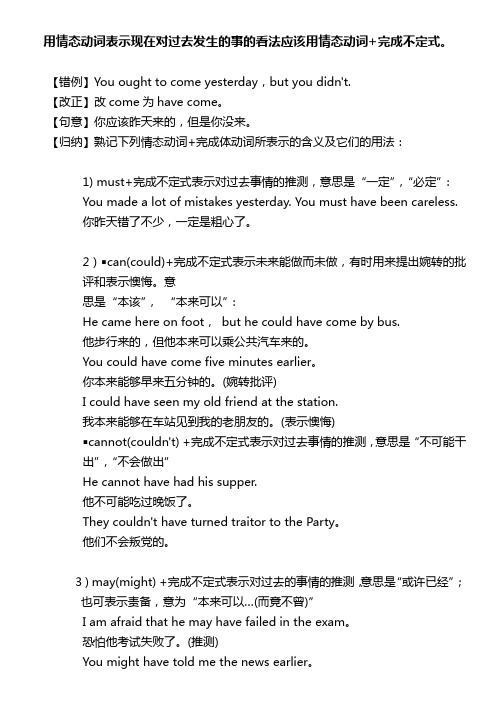
用情态动词表示现在对过去发生的事的看法应该用情态动词+完成不定式。
【错例】You ought to come yesterday,but you didn't.【改正】改come为have come。
【句意】你应该昨天来的,但是你没来。
【归纳】熟记下列情态动词+完成体动词所表示的含义及它们的用法:1) must+完成不定式表示对过去事情的推测,意思是“一定”,“必定”:You made a lot of mistakes yesterday. You must have been careless.你昨天错了不少,一定是粗心了。
2)■can(could)+完成不定式表示未来能做而未做,有时用来提出婉转的批评和表示懊悔。
意思是“本该”,“本来可以”:He came here on foot,but he could have come by bus.他步行来的,但他本来可以乘公共汽车来的。
You could have come five minutes earlier。
你本来能够早来五分钟的。
(婉转批评)I could have seen my old friend at the station.我本来能够在车站见到我的老朋友的。
(表示懊悔)■cannot(couldn't) +完成不定式表示对过去事情的推测,意思是“不可能干出”,“不会做出”He cannot have had his supper.他不可能吃过晚饭了。
They couldn't have turned traitor to the Party。
他们不会叛党的。
3 ) may(might) +完成不定式表示对过去的事情的推测,意思是“或许已经”;也可表示责备,意为“本来可以…(而竟不曾)”I am afraid that he may have failed in the exam。
恐怕他考试失败了。
(推测)You might have told me the news earlier。
Model Verb
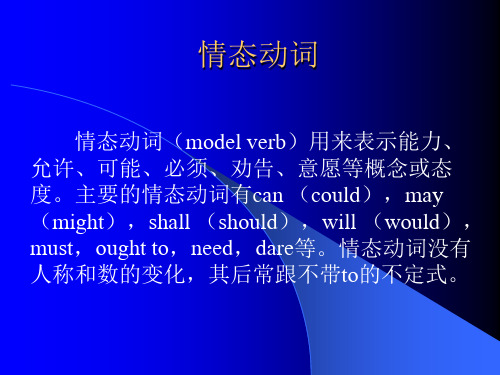
2. 情态动词的特殊用法
(1) 情态动词+不定式完成时 1) can/could, may/might, must + have + 动词的过去分词 用于肯定句:表示对过去事件的主观判断,推测过去某动作 “可能”、“也许”、“一定”已发生。 Tom could have taken the dictionary. I saw him using it last Sunday. I can’t find my sunglasses. I may/might have left them at the restaurant yesterday. You screamed in your sleep last night. You must have had a terrible dream. 用于否定句:表示推测过去某动作“可能”、“也许”、 “一定”没有发生。 She couldn't have finished her work so soon. She may not have seen you. Dad mustn't have washed the dishes last night.
will/would 表示动作者愿意。 I will lend you the book if you need it. I won’t do it again. I have been trying to open the door, but the key won’t turn. “will you/would you…” 在下列句中表示客气的建 议、询问。 Will you please have a drink? Would you please pass me the salt? Would you like a cup of tea? Would you mind if I opened the window? Would you mind opening the window? Would you mind my opening the window? would 还表示过去的习惯。等于used to On Sundays he would get up early and go fishing.
情态动词的可考用法
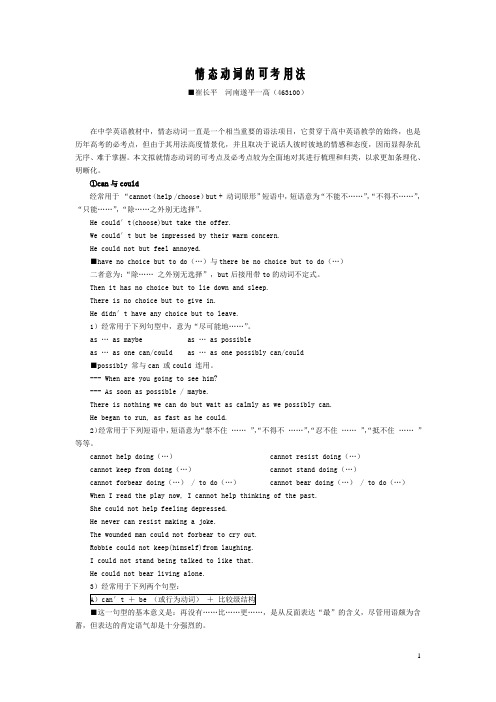
情态动词的可考用法■崔长平河南遂平一高(463100)在中学英语教材中,情态动词一直是一个相当重要的语法项目,它贯穿于高中英语教学的始终,也是历年高考的必考点,但由于其用法高度情景化,并且取决于说话人彼时彼地的情感和态度,因而显得杂乱无序、难于掌握。
本文拟就情态动词的可考点及必考点较为全面地对其进行梳理和归类,以求更加条理化、明晰化。
①can与could经常用于“cannot(help /choose)but + 动词原形”短语中,短语意为“不能不……”,“不得不……”,“只能……”,“除……之外别无选择”。
He could′t(choose)but take the offer.We could′t but be impressed by their warm concern.He could not but feel annoyed.■have no choice but to do(…)与there be no choice but to do(…)二者意为:“除……之外别无选择”,but后接用带to的动词不定式。
Then it has no choice but to lie down and sleep.There is no choice but to give in.He didn′t have any choice but to leave.1)经常用于下列句型中,意为“尽可能地……”。
as … as maybe as … as possibleas … as one can/could as … as one possibly can/could■possibly 常与can 或could 连用。
--- When are you going to see him?--- As soon as possible / maybe.There is nothing we can do but wait as calmly as we possibly can.He began to run, as fast as he could.2)经常用于下列短语中,短语意为“禁不住……”,“不得不……”,“忍不住……”,“抵不住……”等等。
- 1、下载文档前请自行甄别文档内容的完整性,平台不提供额外的编辑、内容补充、找答案等附加服务。
- 2、"仅部分预览"的文档,不可在线预览部分如存在完整性等问题,可反馈申请退款(可完整预览的文档不适用该条件!)。
- 3、如文档侵犯您的权益,请联系客服反馈,我们会尽快为您处理(人工客服工作时间:9:00-18:30)。
“情态动词+不定式完成式”用法解析【摘要】本文在分析历年高考中有关“情态动词+不定式完成式”试题的基础上,总结了“情态动词 +不定式完成式”结构常见的几类用法,并辨析了其联系与区别。
【关键词】情态动词,不定式完成式情态动词的“情态动词 +不定式完成式”结构是英语语法中的难点。
在掌握情态动词基本用法的基础上,学习者需进一步结合各种句式与虚拟语气的用法才能更容易理解“情态动词+不定式完成式”这一结构。
一、“情态动词+不定式完成式”结构表示对过去发生的事实的可能性的推测当“情态动词 +不定式完成式”结构表示推测过去某动作发生的可能性时,在这些情态动词中,就表示的可能性程度而言, must最大, will /would其次, should/ought to再次,could又次之, may更次之, might 最小(杨兆民, 1993)。
1.may/might+have+过去分词“ may/ might+have+ 过去分词”译为“也许已经” ,表示对过去发生的动作或存在的状态的推测,其表示可能性的语气最弱;该结构的否定形式可译为“当时也许没有” 。
表示可能性时一般用 might 指过去,用 may 指现在; may 有时也可用于完成式或完成进行式,指过去发生的动作或过去持续的动作。
另外,“ may+have+过去分词”含有“至今可能仍存在”的意思;might 只用于间接引语中(薄冰, 1998)。
例如:You may have read some account of the matter. 你也许读过关于这件事的一些报道。
He may have been waiting for us for an hour. 他也许等我们一个小时了。
(指持续的动作)Whatever your parents may have told you —— there is a real Santa Claus. And I should know, because I've seen him myself! 不管你父母告诉过你什么——在我看来,圣诞老人真的存在。
我当然知道,因为我曾亲眼见过。
Sorry I'm late. I might have turned off the alarm clock and gone back to sleep again. 对不起,我迟到了。
可能我当时把闹钟按了之后又睡着了。
( might have turned off 显得辩解苍白而底气不足。
)They might not have gone to the movies yesterday evening. The light was still on at their home then. 昨晚他们可能没有去看电影,因为当时他们家的灯亮着。
You may have met each other before. 或许你们以前已经见过面。
He may not have achieved all his aims. But his effort is praise worthy. 他可能没有达到他的全部目标,但他的努力值得赞扬。
She may/might have gone to the hospital. 她或许到医院去了。
The children may have gone to bed. 孩子们可能已经上床睡觉了。
They might not have settled the problem. 他们可能尚未解决那个问题。
2.can/could+have+过去分词( 1)“can/ could+have+ 过去分词”可译为“当时可能” ,表示对过去发生的动作或存在状态的推测,其可能性要强于“ may/ might+have+ 过去分词”,可用于否定句、疑问句和感叹句中。
can 一般不用于肯定句,肯定句中多用 could ,用于疑问句时 could 的可能性比 can 弱(李丙尧, 2002)。
试比较:I didn 't see her at the meeting this morning; she can 't/ couldn 't have spokenat the meeting. 今天上午我在会议上没有见到她,她不可能在会上发言。
He can't have finished the work so soon. 这项工作他不可能完成得这样快。
She was very upset. She could have failed again. 她很沮丧,可能又失败了。
(可能性较大)Tom hasn't come back yet. He may have missed the bus again. 到现在为止汤姆还没有回来,(当时)他可能又错过公交车了。
(可能性较弱)( 2)“ can't/ couldn't+have+ 过去分词”可以译为“当时不可能” ,表示一种非常有把握的否定推测,常用来说明一种到目前为止的情况。
can't 相当于 couldn't ,但后者的语气较为委婉。
表示这种否定推测时不可以用 may not 或 mustn't。
在疑问句中询问过去是否可能发生过某事,不用“may/might+have+ 过去分词”结构,而用“ can/ could+have+ 过去分词”结构(李福荣, 2007)。
例如:Jack can't have arrived yet; otherwise, he would have telephoned me. 杰克当时不可能到的,否则他早就给我打电话了。
My sister met him at the Grand Theater yesterday afternoon, so he couldn't have attended your lecture. 昨天下午我姐姐在大剧院见过他,所以他不可能听了你的演讲。
He can't have known about the news, otherwise he would tell us about it. 他一定不知道这消息,否则他会告诉我们的。
(强调到目前为止)注1)表推测时can 不能用在肯定句中,常用在疑问句或否定句中。
如:She' s two hours lat—e — what can he have happened? 他晚了两个小时——可能发生了什么事呢 ?2)could 和might 都可用来提出婉转的批评,有时二者可以互换。
You could/might have been more careful. 你本来可以再细心些。
You might/could have made greater progress. 你的进步本来是可以更大一些的。
You might at least have answered my letter .你至少可以给我回信嘛。
五、should+have+过去分词或ought to+have+ 过去分词3.should/ought to+have+过去分词“ should/ ought to 十 have+过去分词”意为“当时比较可能” ,表示对过去的动作或状态的可能性的推测,其推测的把握性要大于“ can/could+have+ 过去分词” ,可用于肯定句、否定句和疑问句。
在此形式中, ought to 比 should 的语气更为肯定。
例如:He set out early in the morning, so he should / ought to have arrived home. 他一早就出发了,所以应该到家了。
They started at eleven o'clock this morning. They oughtn't to / shouldn't have arrived there in the afternoon. 他们早上 11 点才动身,下午时应该还未到达。
4.will/would+have+过去分词“will / would+have+过去分词”意为“当时很可能” ,用于第二、三人称,表示对过去的动作或状态的可能性比较有把握的推测, would 所表示的可能性比 will 小。
例如:You will have heard the news. I'm sure. 你很可能听说过这个消息,我敢肯定。
The police would have gone through every room last night. 昨晚警察很可能搜查过每个房间。
His brother would not have been elected as President. 他哥哥很可能没有当选总统。
5.must+have+过去分词“ must+have+过去分词”意为“当时一定 ,, ” ,“准是已经 ,, ” ,“想必,, 了” ,“肯定已 ,, 了” ,“一定是 ,, ” 。
表示对过去的动作或状态的可能性很有把握的推测,也可以表示对到目前为止的情况的推测。
需要注意的是,这种结构的否定式不是“ mustn't+haye+过去分词” ,而是“ can't/ couldn't+have+ 过去分词”;这种结构的疑问式也不能将 must 置于主语之前,而要用 can/ could 来取代must:,构成“ can/ could+主语 +have+过去分词 ,, ?”(张立新, 2005)。
例如:George is behaving strangely; I think he must have drunk. 乔治的表现很古怪,我想他一定是喝多了。
It 's time for the meeting. They must have arrived there by now. 到开会的时间了。
想必他们现在已经到了。
The ground is wet this morning. It must have rained last night. 今天早晨地面是湿漉漉的,昨天晚上一定下雨了。
I didn't hear the phone, I must have been asleep. 我没有听见电话声,当时我一定是睡着了。
Bob said he was going to join our club but he didn't. He must have changed his mind. 鲍伯曾说过要加入我们俱乐部,可是他并没加入,他一定是变卦了。
